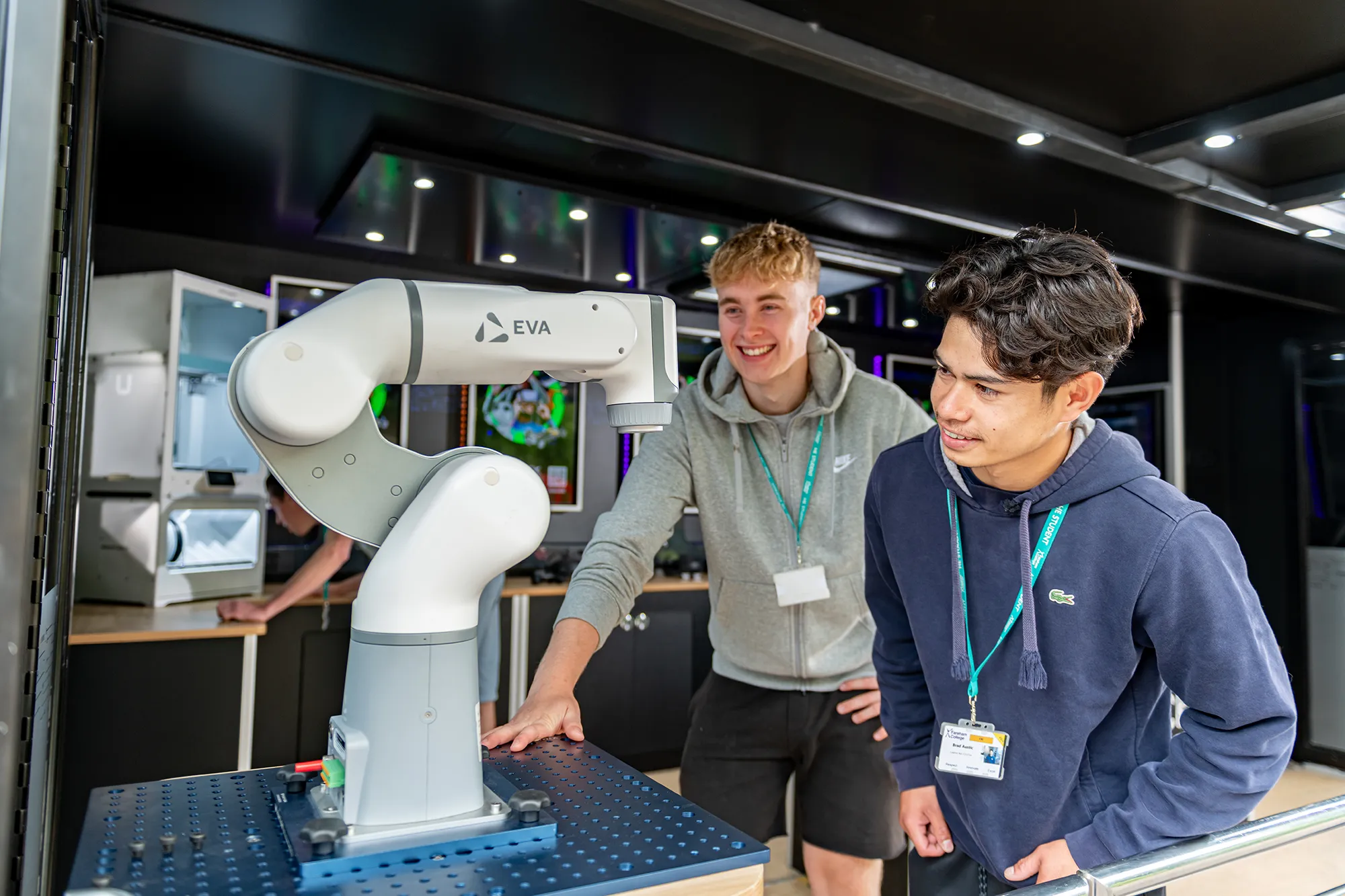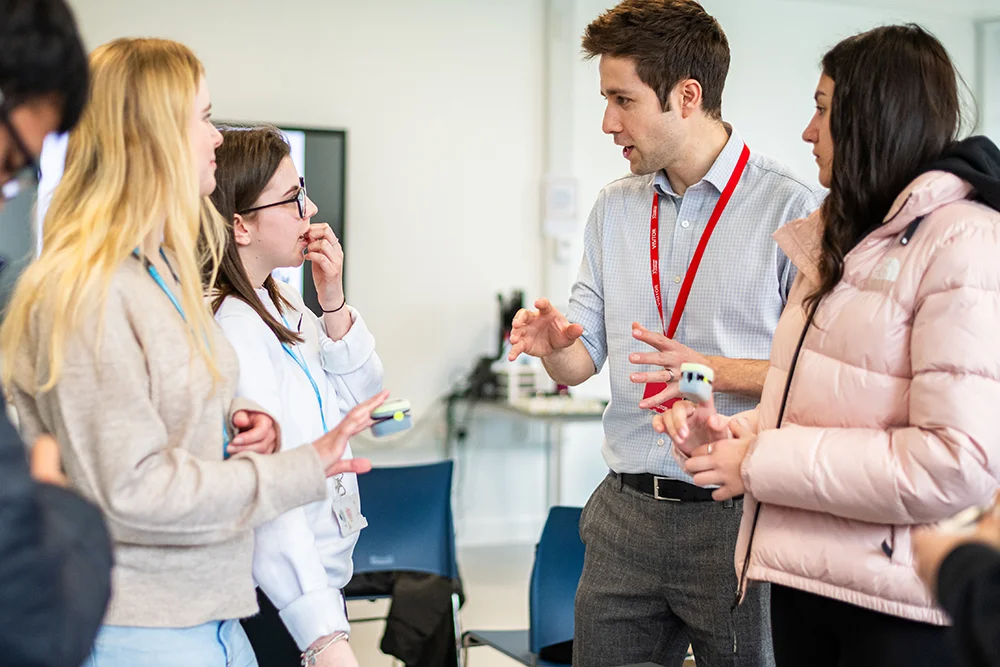This website uses cookies to improve your experience. We'll assume you're ok with this, but you can opt-out if you wish. Read More

Robotics and Automated Systems are at the core of the strategic direction for many global industries. Companies are developing robotic and autonomous solutions and products, but need graduate engineers with the expertise to define the technology.
This Higher National Certificate (HNC) in Robotics and Mechatronics course is designed to provide you with advanced core skills and knowledge to enable you to understand the fundamental processes and techniques in autonomous systems, blending subjects such as, electronics, control, manufacturing principles, and mechanics. It combines theoretical and practical engineering principles, with application to real industrial problems. It is equivalent to the first year of study on an undergraduate degree at university.
You will study the following modules:
Engineering Mathematics.
Mathematical analytical skills are critical to your future career as an Engineer and this module will enable you to acquire a deeper understanding of how these skills will be applied in a range of engineering applications. We will support you in acquiring competence and confidence in carrying out mathematical calculations applied to an Engineering context.
Introduction to Programmable Logic Controllers (PLCs)
The programmable logic controller has revolutionised the automation industry and today PLCs can be found in everything from manufacturing equipment to vending machines. In this unit, you will develop an understanding of the evolution, types and applications of PLCs, learn how to select and develop a PLC system, integrate features of functional safety based on their understanding of risk management, and evaluate the wide range of communication technologies available on modern PLCs.
Pneumatic and Hydraulic Systems
Pneumatic and hydraulic systems involve the transmission of force and motion through a fluid and such systems are to be found in transport, manufacturing, mechanical handling and process control. This unit aims to extend your understanding of pneumatic and hydraulic fluid power systems and their modern industrial applications and enable them to design fluid power circuits. You will study circuit symbols and diagrams and consider circuit designs. You will also examine the characteristics and selection of components and equipment and evaluate relevant industrial applications.
Engineering Principles
This module will introduce the key concepts of mechanics, fluids, electrical principles and heat transfer by starting with first principles and building upon these to develop an understanding of the fundamental areas of engineering science. There is a strong emphasis on practical work, including experiments involving both mechanical and electrical systems.
Introduction to Robotics
This module will introduce the basics of sensors, actuators, path planning, kinematics, dynamics and control in the context of robotic systems. In particular it focuses on the theoretical design aspects of industrial robot manipulators as well as allowing you to develop a detailed appreciation of the implementation of control and path planning techniques in the context of robot manipulators.
Introduction to Mechatronics
With technological advances in systems such as manufacturing production lines, automated baggage handling systems and car cruise control, the use of mechanical/electrical systems has become part of our everyday lives. Topics included in this unit will include consideration of component compatibility, constraints on size and cost, control devices used, British and/or European standards relevant to application, sensor types and interfacing, simulation and modelling software functions, system function and operation, advantages and disadvantages of software simulation, component data sheets, systems drawings, flowcharts, wiring and schematic diagrams.
Course Fee
The fee shown below is the total course fee for the two-year qualification.
Awarding Body
This HNC is delivered in partnership with and awarded by Southampton Solent University.
Financial Assistance
Did you know you can take out a Higher Education Loan to pay for this course? The Student Loans Company provides loans and grants to students at college studying Higher Education and you don’t start repaying until you earn over a certain amount.
Policies
For our HE Fees, Admissions and Student Protection Policies, please visit our Policies page.

This course is endorsed by the South Coast Institute of Technology and represents a pathway to further progression towards higher level qualifications.
The South Coast Institute of Technology is a collaboration of five further education colleges and two universities. We work with well known employers to deliver industry-led courses which fill skills gaps and support the economic growth of the South Coast. You can read more about the South Coast Institute of Technology by clicking the button below. South Coast IoT
You should have at least 72 UCAS points from a Level 3 qualification such as a National Diploma or Certificate in a related engineering subject or related A Level subjects, and/or equivalent qualifications and experience. Grade 4/C or above is required in GCSE Maths.
Successful completion of this Level 4 HNC will enable you to progress to the Level 5 Higher National Diploma (HND) in Robotics and Mechatronics. From there you can progress to university and top up to a full degree; the course has been designed to facilitate smooth progression into further study at Southampton Solent University.
Alternatively, this university-level qualification will enable you to develop your career within your existing workplace or through a Higher Apprenticeship.
Click Our Events button below to explore upcoming dates.
We have events at all of our locations in March.

*Please Note: Start dates given for our HE courses are indicative only. Courses will be begin in the week indicated below but the specific days of the week that a course will be delivered are dependent on resource and staff availability and therefore cannot be guaranteed until final timetables are completed.
Availability
Unfortunately this course is not currently open for applications. If you would like to be notified when it becomes available again then please register your interest using the button below
College is not just about your course – it’s an opportunity to have fun, meet new people and explore your interests! You can socialise with friends in the café and comfy seating areas, join a club or sports team or attend exciting events around the college. Many of our enrichment opportunities are also great on your CV or UCAS application to demonstrate your commitment and enthusiasm outside of your studies.
Your time at college can also be affected by life or health difficulties, and it’s okay to need support. Our specialist teams are here every day to listen and give advice, whether it’s about career planning, financial support, mental health, or something else. And if you have a long-term support need or medical condition, we’ll work with you on personalised learning support to help you achieve your full potential.
This website uses cookies to improve your experience. We'll assume you're ok with this, but you can opt-out if you wish. Read More
| Name | Domain | Purpose | Expiry | Type |
|---|---|---|---|---|
| wpl_user_preference | shcg.ac.uk | WP GDPR Cookie Consent Preferences. | 1 year | HTTP |
| Name | Domain | Purpose | Expiry | Type |
|---|---|---|---|---|
| __hstc | shcg.ac.uk | Hubspot marketing platform cookie. | 2 years | HTTP |
| __hssrc | shcg.ac.uk | Hubspot marketing platform cookie. | Session | HTTP |
| __hssc | shcg.ac.uk | Hubspot marketing platform cookie. | Session | HTTP |
| Name | Domain | Purpose | Expiry | Type |
|---|---|---|---|---|
| _ga | shcg.ac.uk | Google Universal Analytics long-time unique user tracking identifier. | 2 years | HTTP |
| IDE | doubleclick.net | Google advertising cookie used for user tracking and ad targeting purposes. | 1 day | HTTP |
| Name | Domain | Purpose | Expiry | Type |
|---|---|---|---|---|
| __cf_bm | hs-scripts.com | Generic CloudFlare functional cookie. | Session | HTTP |
| hubspotutk | shcg.ac.uk | HubSpot functional cookie. | 10 years | HTTP |
| Name | Domain | Purpose | Expiry | Type |
|---|---|---|---|---|
| CLID | www.clarity.ms | --- | 1 year | --- |
| _clck | shcg.ac.uk | --- | 1 year | --- |
| _clsk | shcg.ac.uk | --- | 1 days | --- |
| _ga_KG2505FCF1 | shcg.ac.uk | --- | 2 years | --- |
| _gcl_au | shcg.ac.uk | --- | 3 months | --- |
| test_cookie | doubleclick.net | Google advertising domain. | Session | HTTP |
| AWSALBCORS | kuula.co | --- | 7 days | --- |